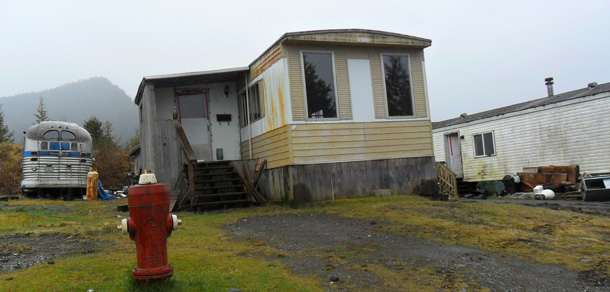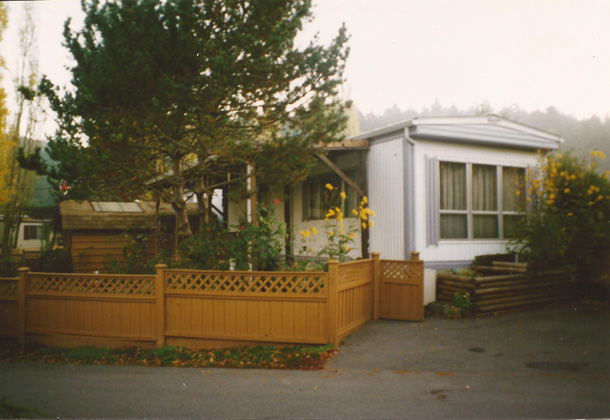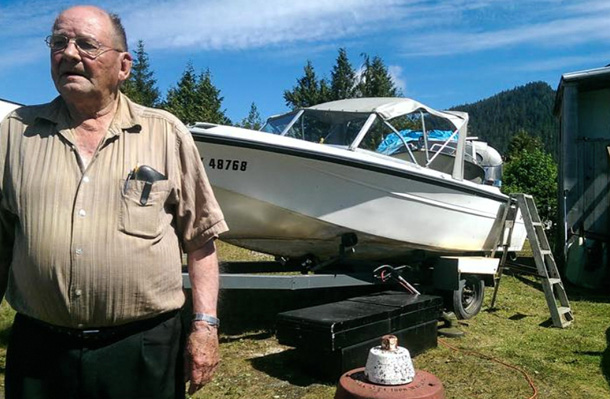British Columbia NDP MLA Harry Bains introduced a private members' bill on Monday to better protect residents evicted when manufactured home parks are redeveloped. His motion highlights a below-the-radar threat to tens of thousands of B.C. households living in some of the province's most affordable market housing.
This is the third time the NDP has introduced such a bill. The first was 10 years ago, shortly after Bains met an elderly couple facing eviction from their long-term home in a manufactured home park in his Surrey-Newton riding. Bains and the municipality helped stop their eviction, but the story stayed with the MLA.
"These are seniors who built this province," Bains said. "They need to be treated fairly." But sadly, stories like the one that motivated Bains remain common.
Take the situation of Ken Jennings and Mary Lamb-Smith. The elderly pair didn't have a very merry Christmas last year. On Dec. 9 a bailiff delivered a writ of possession to the elderly couple and their neighbours, giving them just three days to pack up their belongings and leave -- along with their homes.
Jennings, 78, and Lamb-Smith, 80, lived in Kurpils Trailer Court in Port Edward, B.C., where residents parked their RVs or, in Jenning's case, their manufactured home. Jennings moved in 27 years ago with his wife, who later passed from cancer. Lamb-Smith joined him in 2008.
In August 2014, the park's owner, Stonecliff Properties, served initial eviction notices to its tenants, saying it couldn't upgrade critical health and safety infrastructure while tenants were living at the park. Tenants were still fighting eviction when the bailiff arrived last December.
"We didn't have a Christmas this year," Jennings said on the phone from Port Edward, "It was impossible." Earlier this spring, Stonecliff started destroying the homes and RVs abandoned on its property.
The couple stayed with friends for two weeks before finding a rental home. At $800 a month, it's almost four times the $215 "pad rent" they paid monthly at the park. But for a couple living on about $45,000 annually, it's a steal in a town that's booming thanks to a planned liquefied natural gas port.
"You can't get anything for less than $1,000, and that's provided it doesn't fall down when you open the door," Jennings said. His current home is older than he is, "and it shows, too."
'Mobile' in name only
While technically "mobile," manufactured homes need a crane and transport truck to move. Utilities must be disconnected and then reconnected at the new site, adding costs. Many homes are too old to withstand moving, and some parks refuse homes past a certain age.
Jennings was quoted $10,000 to move his 60 ft. "single-wide" 1974 manufactured home to nearby Prince Rupert. He had neither the money nor land to put it on, so it remained in the park, where it may by now have been torn down. Jennings didn't know his home's value before he left it, but guesses a 42-year-old home in good condition -- with a place to put it -- would sell for $25,000 to $30,000.

B.C.'s Active Manufactured Home Owners Association estimates that 30 manufactured home parks have closed across the province since 2002. Not a huge number, when you consider the association says there are roughly 1,100 parks altogether -- the provincial government doesn't keep track -- and that manufactured homes make up about three per cent of B.C.'s stock of 1.9 million dwellings.
But with monthly pad rents ranging from under $200 to $700, and houses available for less than $100,000, such parks are a significant source of affordable housing, sheltering some 57,000 B.C. households. And thanks to rising land costs, they're increasingly at risk, leaving tenants exposed: the Manufactured Home Park Tenancy Act offers evicted homeowners little in the way of compensation.
"We have nothing against redevelopment," explained Joyce Klein of the Home Owners Association. "It's a necessary thing and it's going to happen. But people need to be compensated."
Rezoning doubled park land values
The province last looked at the issues facing manufactured home parks nearly a decade ago. Using 2001 stats, it found that a quarter of the households in manufactured homes were led by people 65-plus. A fifth of owners were under 35. Their average income in 2000 was $37,989, or $51,253.09 in today's dollars.
The same study found that a park's land value more than doubled, rising on average by 122 per cent, if it was rezoned for single- or multi-family dwellings.
Al Kemp, executive director of the Manufactured Home Park Owners' Alliance of BC, representing 370 parks in the province, says the majority are family businesses: "We're in the business of operating manufactured home communities and providing housing for the long term," he said, adding that parks are such good long-term investments that some people have them instead of RRSPs.
Kemp is emphatic that his members don't redevelop their properties. But he concedes that sometimes redevelopment makes financial sense.
"In one of the municipalities in the Lower Mainland, if I could put [in] a 40 or 20-storey condominium with 300 units that I can sell for $350,000 to $500,000 a piece," he said, compared to renting 70 manufactured home pads at $500 a month, "The math is pretty simple."
Act last changed 'for homeowners'
In 1998 Jean Caha, then 37, purchased a $55,000 home in a Pedder Bay manufactured home park. Diagnosed with systemic sclerosis, an autoimmune disease with symptoms that include joint pain, shortness of breath and cold sensitivity, Caha was on disability and had to borrow $5,000 from her mother for a down payment. The rest was covered by a mortgage from the bank.
Before she moved in, Caha said she quizzed her future landlords, Oak Bay Marine Group, on their intentions for Pedder Bay. "You don't want to put that kind of money into something, and work hard for something, to have it taken away from you," she said.
At the time redevelopment was probably not in the cards for Oak Bay Marine Group. Provincial law then required landlords to reimburse tenants evicted for redevelopment up to $10,000 each for moving costs. But in 2002 the newly elected Liberal provincial government changed that penalty to 12 months' pad rent -- often a much lower amount.
According to the housing ministry, the change was supposed to benefit homeowners: the old law looked generous, but tenants had to pay their costs and then get landlords to reimburse them. If landlords balked, they needed "to go to arbitration to decide if the costs were proper." That left homeowners subject to the whims of the Residential Tenancy Branch, an agency widely criticized by activists and ex-employees alike as "inconsistent."
'This needs to stop'
In 2007, Oak Bay issued eviction notices to every tenant in Caha's park, saying it was redeveloping it for RVs belonging to patrons of its nearby marina.
Homeowners fought the eviction, arguing in B.C. Supreme Court that Oak Bay was really evicting them because it had failed to fix a long-standing sewage leak that was in violation of its permit. Court documents show that environment officials had warned Oak Bay as early as 1999 to plan for a second sewage treatment facility.
Caha said she had complained about the sewage leak for years. "Their lawyer actually called me the sewer lady," she recalled.
Nonetheless, the judge ruled in Oak Bay's favour. In February 2009, everyone was forced out. Under the new rules, Caha received only $5,400 to move. (Because they didn't actually move their home, Jennings and Lamb-Smith got nothing.)

Caha still owed $30,000 on her mortgage and lost her house to the bank. She'd started a side business boarding dogs with hopes of getting off disability. But she didn't have the financial history to qualify for another bank loan.
For the next six years, Caha struggled. Frequent pneumonia, worsened by her systemic sclerosis, left her chronically underweight and in constant pain. She was frequently homeless, moving at one point to Mexico, shifting between squatting, renting and living with an employer, then back to Sooke. She lives there today, in a manufactured home bought by clients of her re-established dog-boarding business.
In some ways, Caha got off easy. She believes one-third of Pedder Bay's former residents went bankrupt as a result of the eviction, and attributes the deaths of elderly neighbours shortly afterward to the associated stress. Now 55, Caha is so deeply troubled by the events that she's considering filing a constitutional challenge.
"This needs to stop," she said, emotion audible in her voice. "Our lives need to be restored, because it's wrong."
The 'strata' non-solution
The month before Caha and her neighbours were forced from Pedder Bay, the B.C. government announced that it had purchased eight acres in Nanaimo and was installing 50 manufactured home pads for sale under strata titles. The announcement came shortly after Oak Bay emptied a Ladysmith park redevelopment.
Two months later, BC Housing Minister Rich Coleman told municipalities: "We want you to allow, without development cost charges or any charges whatsoever, any manufactured home park in your community to go to a bare-land strata title so it can sell its lots to its tenants."
According to B.C.'s Ministry of Housing, two of the 50 pads in the Nanaimo park were rented when government purchased the land. Today, six out of 50 pads are being rented -- not purchased. Caha wonders why no one from Pedder Bay was offered the opportunity to move there.
But it's unclear how many the offer would have helped.
According to a 2009 BC Housing study, a strata-model park would cost tenants an average of "$1,336 per month as well as a monthly condo fee of $300" (a total of $1,835 in 2016 dollars). By CMHC's standard, that implied an annual income of $51,240 then ($57,488 today) to be affordable -- well above Ken Jennings' and Mary Lamb-Smith's income, for two.
The same study looked at other financial configurations -- renting homes and pads, starting a new park, upgrading an old one. Each would cost residents at least double the monthly pad rental in an existing park. The researchers concluded that a 'strata' park would only be affordable with subsidies, or if tenants made significant equity contributions themselves, not something many manufactured home owners can do.
NDP takes third stab at reform
Both Stonecliff and Oak Bay had the legal right to redevelop their properties. And the bill that Bains tabled earlier this week to amend the Manufactured Home Park Tenancy Act, even if passed, won't help seniors suffering from past evictions.
But it would require park owners in future to inform tenants before they submit a rezoning request to the municipality. Landlords would have to work with homeowners and municipal officials to develop a transition plan ensuring that no tenant is left homeless. Any new housing on a park site would need to be offered first to former tenants.
If the bill passes, park owners would also be on the hook for up to $30,000 in moving expenses for each homeowner at the time of the eviction. If homes were too old for other parks, developers would have to buy them from their owners for their assessed market value.
Although the bill won't benefit him, Jennings isn't giving up entirely. He's working with an advocate in Kitimat, hoping at least to get back the nine months of pad fees he paid after receiving the eviction notice.
"We'll never get over it," he said. "Being 78 years old, what would you expect of us?" ![]()
Read more: Housing
















Tyee Commenting Guidelines
Comments that violate guidelines risk being deleted, and violations may result in a temporary or permanent user ban. Maintain the spirit of good conversation to stay in the discussion.
*Please note The Tyee is not a forum for spreading misinformation about COVID-19, denying its existence or minimizing its risk to public health.
Do:
Do not: